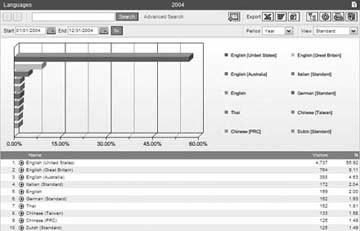Hack75.Know How to Use Visitor Language Reports
Hack 75. Know How to Use Visitor Language Reports
Knowing which languages your visitors speak will help you improve your message and improving your message will help your conversion rates. While tracking your visitor's specific geographic distribution [Hack #78] is important, consider the primary and secondary languages of you visitors. Online, you should strive to be helpful, courteous, and friendlyat least when you can determine that you have enough foreign traffic to benefit from your benevolence. But how do you know when you should consider translation? Easyuse your visitor language reports! 5.9.1. Visitor Language ReportingMost web measurement applications provide language reporting based on information gleaned from the visitor's web browser, most often generating a report similar to that seen in Figure 5-14. The languages reported are picked up from the web visitor's browser and controlled by a setting you can easily change in your browser if you'd like. Want to try this out? In Firefox simply clickTools The information reported in a visitor languages report is particularly good, because users are telling you which language they prefer to communicate in. If I understand English but I read, speak, and write Spanish, I am very likely to change my primary language setting to "Spanish" in the hope that your web site will speak to me in Spanish. Again, if you stop to think about this, you'll see the power in using this information. Figure 5-14. Visitor languages report 5.9.2. How to Use Language InformationTo leverage your visitor language report, you're looking for larger-than-expected segments of visitors browsing your site in languages other than the one(s) you currently support. Using the data from Figure 5-14, you can see that 1.5 percent of the visitors in 2004 prefer Dutch as their primary language. Cross-referencing this with the Internet averages for languages, you find that the site has nearly three times the Internet average for Dutch speakers. Armed with this data, you might consider translating part of the site into Dutch in an effort to better connect with those visitors, increasing their likelihood to convert. Still, translation can be very expensive, so be cautious when deciding when and how much to translate. 5.9.3. Knowing When and How Much to TranslateTranslating your site into multiple languages shouldn't be attempted on a whim; it can be an arduous and expensive task. The major reason you should keep track of your visitor languages report is to help determine if or when it is necessary to translate. As a rule of thumb, any time you see more than 10 percent of visitors browsing in a language other than English (assuming your site is already in English), you should start to explore translating your site. Again, because of the associated costs, the best way to start exploring the value of translation is to convert a small number of pages and then monitor the volume of traffic to those pages. Depending on your particular business model, you may want to offer a series of translated pages off of your home page that explain your business's commitment to international visitors, who your business partners are throughout the world, or who to call (by language) if they have any additional questions. Keep in mind that you want this initial translation to be simple so you can gauge the number of visitors who take advantage of the information. This is designed to help you validate the decision to translate further, nothing more. If you then see a significant increase in the number of visitors to your translated pages and (hopefully) an increase in the actions you present on that page, consider translating more of your site. Conversely, if you build a translated page and make it clear that the page is available but then nobody visits the pagewell, perhaps the need for translation is not so great. |
EAN: 2147483647
Pages: 157
 Options
Options  General and then clickthe "Languages button to add any number of International languages you'd like the browser to support. Piece of cake!
General and then clickthe "Languages button to add any number of International languages you'd like the browser to support. Piece of cake!